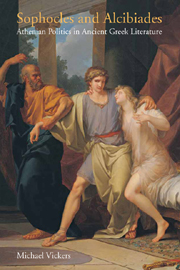Book contents
- Frontmatter
- Contents
- Preface
- 1 The mythologizing of history
- 2 Antigone, Pericles and Alcibiades
- 3 Oedipus Tyrannus, Alcibiades, Cleon and Aspasia
- 4 Ajax, Alcibiades and Andocides
- 5 Philoctetes, Alcibiades, Andocides and Pericles
- 6 Alcibiades in exile: Euripides' Cyclops
- 7 Oedipus at Colonus, Alcibiades and Critias
- 8 Critias and Alcibiades: Euripides' Bacchae
- 9 Alcibiades and Melos: Thucydides 5.84–116
- 10 Thucydides on tyrannicides: not a “digression”
- 11 Alcibiades and Persia (and more Thucydidean “digressions”)
- 12 Alcibiades and Critias in the Gorgias: Plato's “fine satire”
- Epilogue
- Bibliography
- Index locorum
- Index
11 - Alcibiades and Persia (and more Thucydidean “digressions”)
- Frontmatter
- Contents
- Preface
- 1 The mythologizing of history
- 2 Antigone, Pericles and Alcibiades
- 3 Oedipus Tyrannus, Alcibiades, Cleon and Aspasia
- 4 Ajax, Alcibiades and Andocides
- 5 Philoctetes, Alcibiades, Andocides and Pericles
- 6 Alcibiades in exile: Euripides' Cyclops
- 7 Oedipus at Colonus, Alcibiades and Critias
- 8 Critias and Alcibiades: Euripides' Bacchae
- 9 Alcibiades and Melos: Thucydides 5.84–116
- 10 Thucydides on tyrannicides: not a “digression”
- 11 Alcibiades and Persia (and more Thucydidean “digressions”)
- 12 Alcibiades and Critias in the Gorgias: Plato's “fine satire”
- Epilogue
- Bibliography
- Index locorum
- Index
Summary
There is no end to the roll call of scholars who have dismissed the cluster of stories in Thucydides dealing with Cylon, Pausanias and Themistocles (1.126.2–138) – as well as the account of Harmodius and Aristogeiton discussed in Chapter 10 – as “digressions” or “excursuses”. A case can, however, be made for their being necessary parts of the narrative; by his careful choice of language, by means of “emphasis” (“the process of digging out some lurking meaning from something said”; Quint. Inst. 9.2.64), Thucydides succeeds in saying rather more about Alcibiades than might otherwise be possible. The passages were carefully composed in order to enrich the surrounding narrative.
As we have already seen, Thucydides could in any case devote pages to Alcibiadean policy without even mentioning him by name, whether it was his involvement in the campaign against Melos and the cruel treatment of the inhabitants, or the negotiations between the Athenians and the inhabitants of Segesta a year later; or, indeed, in the passage on Harmodius and Aristogeiton, which is redolent of an Alcibiades who lies hidden beneath the text. It has recently been said that “Thucydides' most trenchant statements about the nature of Athenian politics and the fate of Athens were made with Alcibiades clearly in mind”; the “digressions” are where – paradoxically – he is most outspoken in this respect.
- Type
- Chapter
- Information
- Sophocles and AlcibiadesAthenian Politics in Ancient Greek Literature, pp. 141 - 152Publisher: Acumen PublishingPrint publication year: 2008



